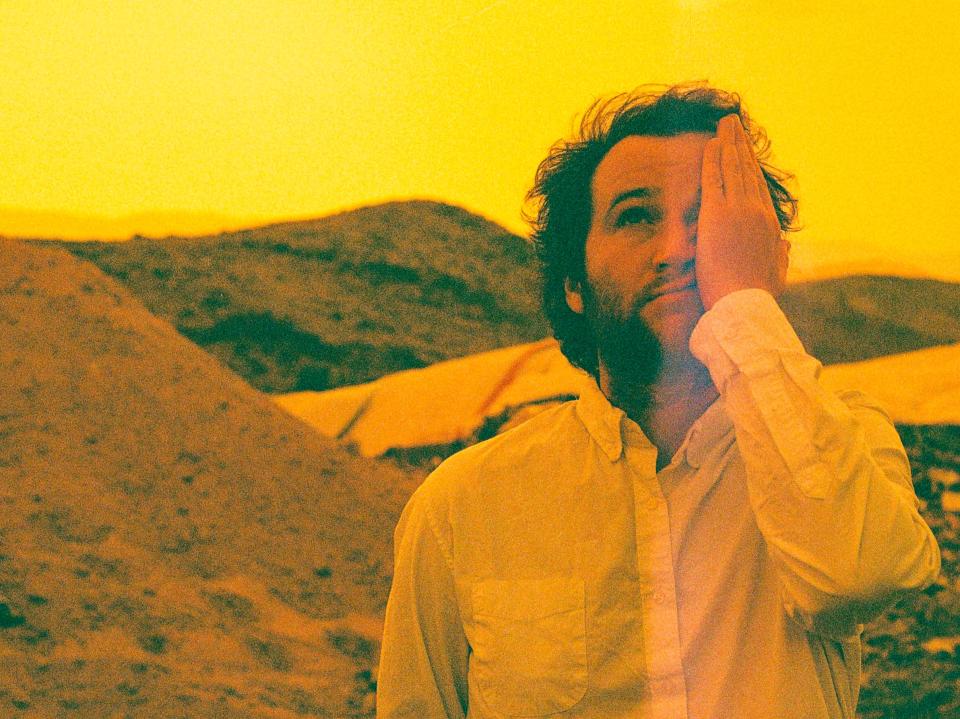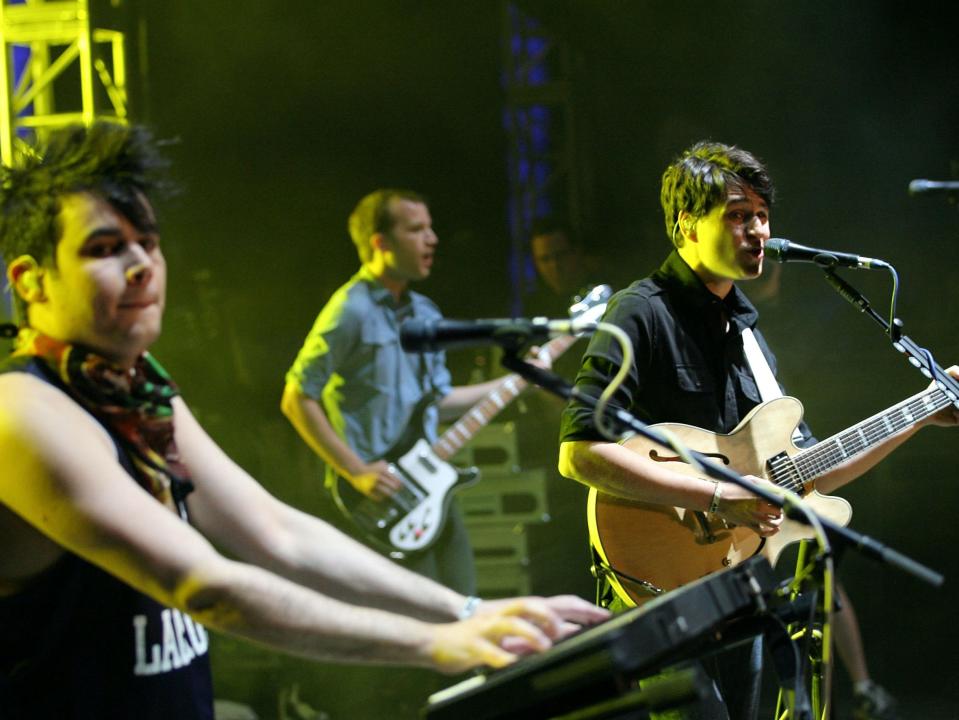Chris Baio: ‘I feel insanely lucky that I don’t need to leave my home to make money’

Chris Baio: 'I started making this record imagining extreme situations and what you as an individual can do’
(Press image)Chris Baio is thinking about legacy. The Vampire Weekend bassist is young, still, but maybe that’s just what happens when you've already been in one of the biggest bands in the world before the age of 36. “Most artists, most songwriters, their best work is usually their earliest, for whatever reason,” he says thoughtfully.
In the time since graduating from Columbia University in 2007, Baio has experienced more career success with the New York indie-rock elder statesmen than he perhaps would have ever thought possible, beginning with the group’s college yacht rock 2008 self-titled debut and leading up to multiple accolades (both 2013’s Modern Vampires of the City and 2019’s Father of the Bride earned Grammys) and a headlining slot at New York City’s Madison Square Garden. He’s been with the group for 14-odd years.
Eventually, as Vampire Weekend achieved new heights as a group, each of its members began to branch off into solo endeavours: Rostam Batmanglij left Vampire Weekend in 2016, dropped his surname and is a sought-after producer, working with alt-pop heavyweights Charli XCX, Clairo, Carly Rae Jepsen and HAIM and teaming up with The Walkmen’s Hamilton Leithauser. Lead singer Ezra Koenig helped produce Beyoncé's 2016 standout Lemonade, created the Netflix animated comedy Neo Yokio and hosts his own talk show on Apple Music (he also had a baby with Rashida Jones). Drummer Chris Thompson, who has a solo album out under the moniker Dams of the West, may have fewer Wikipedia bullet points to his name, but he's done well enough to purchase a $1.6m (£1.1m) “cottage” in Silver Lake and has got into podcasts.
Which brings us to Baio: in the midst of his band’s and his bandmates’ success, the New York native has carved out a promising solo career over the past six years operating under his last name – it’s just “Baio” to you now, and yes, he is related to Scott Baio of Happy Days and Charles in Charge fame. In 2012, he took a tentative step outside the Vampire Weekend pen with his Balearic pop Sunburn EP, then three years later unveiled his first full album, The Names, followed by 2017’s Man of the World. Both ventures bore sonic similarities to VW’s indie-pop aesthetics, with harmless, synthy cuts tackling austere subject matter like the climate crisis, the Trump presidency, male privilege – the type of stuff you’d expect an Ivy League graduate who studied Russian Lit to think about, and not very far removed from the way his band liked to examine their own ageing-millennial navels with varying degrees of irony.
Even now, as musicians the world over are suffering from loss of income, Baio is all too aware of his unique privilege as a successful musician. "I have absolutely nothing to complain about," he acknowledges, speaking from his beach house in Portland, which he says was designed by a former Wall Street Journal editor who wanted the ceiling to resemble a wooden floor (indeed, Baio looks like he’s sitting in an upside-down room). “I feel insanely, insanely lucky that I don't need to leave my home to make money. And I'm OK with not having played a show in a year now.”

Like any artist on the other side of 30, it’s possible that Baio does worry about having already peaked. It could be a fear of creative stagnation that makes him push back against career-musician complacency. Take the new studio he’s built in Eagle Rock, which he calls C+C Music Factory – after the Nineties dance duo – where he honed ideas that first took shape in London, at Damon Albarn’s Studio 13. Sharpening tracks in his very own space allowed him a new measure of command, as he entirely self-produced the album.
Control is a running theme. “I started making this record imagining extreme situations and what you as an individual can do,” he says. “This concept of an extreme thing happening and then imagining how you would react. What would be the best thing you could do? How you could be showing up for the people in your life, whether it's your friends, your family or community? That was the overarching idea of the record.”
The album’s title, Dead Hand Control, is essentially a rumination on what happens to an artist’s work after they die. “I found the idea of trying to control the way that your art is perceived after you die completely fascinating and enthralling,” Baio says. “How much can you really control? What are the limits that an individual can control?
“When MCA of the Beastie Boys died, he said in his will, 'I don't want any of my music used in a TV commercial. That stuff is very nebulous as to whether it actually works. It's this legal grey area. As someone who makes music, like at what point in a song do I control it? Once it goes out into the world, who knows what people are going to do with it?”
Though his earlier albums were pleasantly energetic – like icing on the VW cake, with no real calorific value – Baio really comes into his own here, stepping away from VW’s janglier, Paul Simon-inspired material and leaning into gauzy, post-punk beats. His voice is hardly recognisable at first. On each track, he notches his vocals down a few octaves, and he sounds strikingly like Ian Curtis or Tindersticks’s baritone-voiced leader Stuart A Staples. Although Baio compares himself to someone a little more unlikely. “I found all the interviews that Bradley Cooper gave over the course of [promoting] A Star is Born really fascinating,” he says. “He would always tell this story about how he's singing as low as he could, and eventually hurt his neck or something. I would say, this is my humble version of that, of trying to sing lower.”
Baio’s deeper register is everywhere, as he surfs different pop eras, though it’s not costume-y. He builds on Elvis Costello’s 1970s new wave formula on the wryly upbeat “What Do You Say When I’m Not There?” The scene shifts to a dark, smoke-filled club where Molly Ringwald would probably turn up on the apocalypse-themed “Endless Me, Endlessly”. On the thickly strummed title track, Baio sounds like he’s resurfacing late-Noughties indie-pop, almost as if Matt Berninger of The National was fronting The Dodos. Dead Hand Control is easily the most collaborative solo record he’s ever made, too, with VW backup singer Greta Morgan on vocals and Koenig on the nearly 10-minute closer “O.M.W.”, which Baio says he began writing with the lead singer nearly a decade ago.

“‘O.M.W.’ didn't feel right for Vampire Weekend. It was during a period of time where we were working on what would become Modern Vampires of the City,” he says. “And I just always loved this song. I always thought it was really beautiful and romantic. When I made my first two records, I don't know, maybe it was something about my age at that time, or my idea of what I wanted the record[s] to be. I really didn't want any ballads to be on either of those records. There's something about this time, at this age, and thinking about this record and thinking about its themes were… as I wrote the chorus – ‘on my way, on my way’ – I always thought that the idea was so romantic.”
It’s unlikely that when Dead Hand Control comes out anyone will accuse its creator of being unable to evolve, minus the VW safety net. In fact, the last shows he played with the band in 2019 are precisely what has allowed him to grow as a solo artist. And Vampire Weekend themselves don’t intend to call time any time soon.
“I think that we all walked away from the Father of the Bride tour feeling super energised and super happy about the future of the band and where it'll take us,” he says. There was an heightened level of “excitement over touring and playing shows” because now they could mix up set lists with “four albums worth of material”.
“And I think personally, because I was feeling so good just about music and playing music, it helped me have the energy to push this record out at the same time,” Baio says. “Coming home from tour, rather than sitting in sweatpants and watching TV for a week, I was like, ‘I'm so excited about music. I want to go to my studio and work until I get this record done.’”
Dead Hand Control is out on out 29 January via Glassnote Records
Read More
Bicep dig deeper on their trancey new album, Isles

 Yahoo News
Yahoo News 